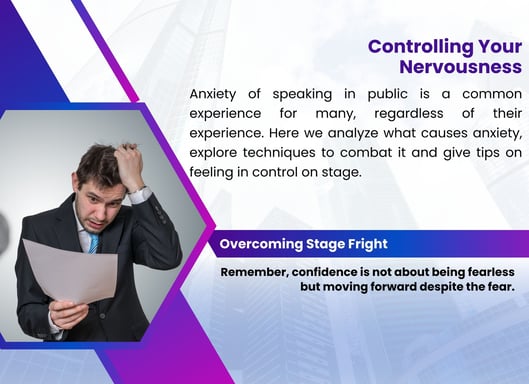Overcoming Stage Fright: Conquer Anxiety for Effective Public Speaking
Learn how to overcome stage fright and conquer anxiety to become a confident public speaker. Whether you're a novice or seasoned speaker, our tips and techniques will help you shine in any presenta...
Mastering Stage Fright in Public Speaking:
A Comprehensive Guide
Introduction:
Stage fright, often a shadow following many public speakers, remains a significant hurdle in professional and personal communication. It's a phenomenon that doesn't discriminate, affecting novices and seasoned speakers alike. Whether you're gearing up for a small boardroom presentation or preparing for a large conference, the butterflies in your stomach signify the same underlying anxiety. Understanding and overcoming this stage fright enhances your delivery and can significantly boost your confidence across various aspects of life. This guide aims to dissect the layers of stage fright in public speaking, providing you with detailed strategies and tools to manage and master your public speaking fears.
Understanding Stage Fright: What Is It and Why Does It Happen?
Definition of Stage Fright in Public Speaking
Stage fright, or performance anxiety, specifically refers to the intense nervousness one feels before or during a performance, where the performer is subject to potential judgment by an audience. It's a physiological and psychological response to the perceived risk of making mistakes in public, which can trigger the body's fight-or-flight response.
Common Triggers of Stage Fright
Several factors can trigger stage fright in individuals:
Inexperience: Lack of familiarity with public speaking often heightens anxiety.
Fear of Failure: Worrying about forgetting lines, freezing up, or failing to engage the audience effectively.
High Stakes: Situations with a lot at risk, such as career advancement or reputation.
Past Experiences: Previous negative experiences while speaking in public can reinforce fear.
The Psychological and Physical Effects of Stage Fright
The impact of stage fright can manifest both mentally and physically. Psychologically, it may lead to self-doubt, negative self-talk, and impaired concentration. Physically, symptoms might include shaking hands, a quivering voice, rapid heartbeat, dry mouth, and excessive sweating. These reactions are the body’s natural response to stress and anxiety, where adrenaline is released and physical senses are heightened.
Understanding these facets of stage fright is the first step towards managing them effectively, allowing speakers to reclaim control over their performance and perception.
The Impact of Stage Fright on Public Speaking
Personal Stories of Stage Fright
Many accomplished public speakers have faced and overcome their fears of public speaking. For instance, Warren Buffet, one of the world's most successful investors and a prolific speaker, admitted to being terrified of public speaking early in his career. He even enrolled in a public speaking course to overcome his fear, which he later credited as a pivotal step in his career development. These stories highlight that stage fright is a common challenge, and overcoming it can be a transformative experience.
How Stage Fright Affects Performance
Stage fright can significantly impact the effectiveness of a presentation in several ways:
Reduced Coherency: Anxiety can make it difficult to follow a logical train of thought, resulting in a presentation that may feel disjointed or unorganized.
Diminished Engagement: Nervous speakers often struggle to connect with their audience, missing cues for interaction and failing to adjust their delivery based on audience feedback.
Impaired Non-Verbal Communication: Body language such as eye contact, gestures, and posture can become rigid or unnatural, detracting from the message.
Understanding these impacts is crucial for recognizing the importance of addressing stage fright to improve individual performances and enhance overall communication skills.
Preparation Techniques to Boost Confidence
Preparation is key to reducing anxiety and boosting confidence for any public speaker. Here are some effective preparation techniques:
Thorough Research and Organization: Know your material inside and out. Confidence in your knowledge can significantly reduce anxiety.
Rehearse Diligently: Practice your speech multiple times, ideally in the venue where you will be speaking or under similar conditions.
Seek Constructive Feedback: Rehearse with friends or mentors who can provide constructive criticism to help refine your delivery and content.
Mental Strategies to Manage Anxiety
Managing your mental state is critical when dealing with stage fright:
Visualization: Imagine yourself succeeding in your speech. Positive visualization can help you become mentally familiar with and comfortable with the concept of speaking successfully.
Affirmations: Use positive affirmations to bolster your self-confidence. Phrases like "I am confident and competent" can reprogram your mental state.
Mindfulness and Meditation: Techniques such as deep breathing and mindfulness can help calm your nerves and center your focus right before you speak.
Physical Exercises to Reduce Tension
Physical exercises can also play a crucial role in managing stage fright:
Breathing Exercises: Practice deep, controlled breathing to help reduce symptoms of anxiety like a rapid heartbeat and shallow breathing.
Vocal Warm-ups: Before you speak, do a series of vocal exercises to warm up your voice, making it less likely to quiver.
Relaxation Techniques: Engage in progressive muscle relaxation or gentle stretching exercises to reduce physical tension.
By combining these strategies, speakers can significantly mitigate the effects of stage fright, enabling a more confident and effective performance.
Tools and Resources for Improving Public Speaking
Recommended Books and Courses
Several resources can be incredibly helpful to enhance your public speaking skills and manage stage fright. Here are some top recommendations:
Books:
“The Art of Public Speaking” by Dale Carnegie is a classic book that offers timeless advice on how to communicate effectively and engage an audience.
“Confessions of a Public Speaker” by Scott Berkun: This modern take provides real-world insights and humorous anecdotes that can ease the fears of public speaking.
"The Confident Public Speaker" by Richard Bierregaard is a recently published book that offers new perspectives on using Artificial Intelligence as an assistant in crafting engaging speeches.
Courses
Toastmasters International: A global organization that offers workshops and regular meetings to practice public speaking in a supportive environment.
Coursera and Udemy courses: These platforms have various courses ranging from introductory public speaking to advanced presentation skills.
Useful Apps and Technologies
Leveraging modern technology can also help you improve your public speaking skills:
Virtual Reality (VR) Training: Platforms like VirtualSpeech provide a VR environment where you can practice public speaking and receive feedback.
Teleprompter Apps: Apps like Oratory allow you to practice your speeches with a teleprompter, helping you get used to speaking from notes without sounding scripted.
These tools and resources provide diverse approaches to learning and improving public speaking, catering to different learning styles and needs.
Expert Advice on Managing Stage Fright
Insights From Professional Public Speakers
Gaining insights from experienced speakers can provide invaluable tips on handling stage fright effectively. For example, Chris Anderson, the curator of TED Talks, emphasizes the importance of connecting with one audience member at a time to create a more intimate and less intimidating environment. This technique can help reduce the overwhelming feeling of addressing a large crowd.
Cognitive Behavioral Techniques for Long-Term Improvement
Cognitive Behavioral Therapy (CBT) offers techniques to help change negative thought patterns that contribute to stage fright:
Cognitive Restructuring: This involves identifying and challenging the negative thoughts that fuel stage fright and replacing them with positive, realistic ones.
Exposure Therapy: Gradually and repeatedly exposing yourself to public speaking situations can help diminish the fear over time, as familiarity often reduces anxiety.
Incorporating these expert tips and psychological techniques into your preparation can significantly improve managing stage fright, helping you become a more confident and effective speaker.
Preparing for Different Types of Speaking Engagements
Adapting to Various Audiences and Venues
Understanding and adapting to the context of your speaking engagement is crucial for effective communication and managing stage fright:
Know Your Audience: Research your audience's interests, age, and background. Tailoring your message to meet their expectations can help build rapport and ease anxiety.
Familiarize Yourself with the Venue: Visit the venue beforehand if possible. Familiarity with the environment can reduce anxiety and help you feel more in control.
Specific Tips for Keynote Speeches, Panels, and Workshops
Different speaking formats require specific strategies for effective delivery:
Keynote Speeches: Focus on delivering a clear, impactful message that aligns with the event's theme. Practice with a timer to ensure your speech fits within the allocated time.
Panel Discussions: Prepare by knowing the topics to be discussed and having key points ready. Listening skills are crucial here; respond thoughtfully to comments from other panelists.
Workshops: Engage with the audience through interactive elements like Q&A sessions, activities, or discussions. Ensure you have a deep understanding of the workshop material to handle spontaneous interactions confidently.
Adapting your approach based on the type of engagement can improve your presentation's effectiveness and significantly reduce stage fright by ensuring you are well-prepared for the specific challenges of each format.
Building a Supportive Environment for Public Speaking
How to Create a Positive Feedback Loop
Creating a positive feedback loop is essential for continuous improvement and confidence building in public speaking:
Seek Constructive Feedback: Ask for feedback from trusted colleagues or mentors after each presentation. Focus on both strengths and areas for improvement.
Implement Changes: Use the feedback to improve your speaking style and content.
Repeat the Process: Regularly speaking and receiving feedback will build your skills and reduce anxiety over time.
The Role of Peer Support in Overcoming Stage Fright
Having a supportive community can play a significant role in managing stage fright:
Join Public Speaking Groups: Organizations like Toastmasters provide a supportive environment to practice speeches and receive constructive feedback.
Participate in Workshops and Seminars: Engaging in group learning experiences can help you see others facing similar challenges, which can normalize stage fright and motivate you to overcome it.
By building a supportive network and creating a routine of seeking and applying feedback, you can develop more confidence and resilience against stage fright.
Long-Term Strategies to Keep Stage Fright at Bay
Continual Practice and Exposure
The most effective way to reduce stage fright over the long term is through continual practice and exposure:
Regular Public Speaking Opportunities: Seek out or create regular opportunities to speak in public. This could be through local clubs, work, or community events.
Diverse Speaking Situations: Challenge yourself by speaking in a variety of settings and formats. This exposure will help you become more adaptable and less sensitive to the anxiety triggers associated with public speaking.
Setting Realistic Goals and Celebrating Achievements
Setting achievable goals and recognizing your progress can also help manage stage fright:
Set Specific Objectives: Whether improving certain aspects of your delivery or increasing the length of your speeches, clear goals can guide your efforts.
Celebrate Small Wins: Recognize and celebrate each achievement, no matter how small. This reinforces positive feelings associated with public speaking and builds confidence.
Reflect on Progress: Regularly reflect on how far you’ve come in your public speaking journey. This can motivate you to keep improving and help diminish fears.
These long-term strategies foster a gradual and steady improvement in handling stage fright, transforming daunting speaking experiences into opportunities for growth and self-improvement.




© 2024 The Confident Orator. All rights reserved.


